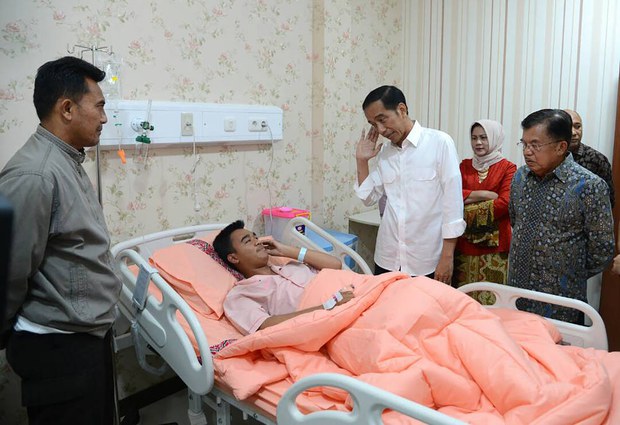Indonesia to Compensate Victims of Bali Bombings, other Terror Attacks
2020.07.21
Jakarta
 Indonesian President Joko “Jokowi” Widodo (center) visits a police officer injured by a suicide bomber near a Jakarta bus station, May 25, 2017.
Indonesian President Joko “Jokowi” Widodo (center) visits a police officer injured by a suicide bomber near a Jakarta bus station, May 25, 2017.
Indonesian President Joko “Jokowi” Widodo signed a government decree granting compensation, restitution and assistance to citizens victimized in terrorist attacks that occurred before 2018, the Witness and Victim Protection Agency (LPSK) said Tuesday.
The decree, which came into force on July 8, replaced one issued two years ago that did not apply retroactively, according to Edwin Partogi, deputy chairman of LPSK, a government agency.
“Victims of past acts of terrorism are entitled to compensation, medical assistance or psychosocial and psychological rehabilitation,” stated the decree, a copy of which was obtained by BenarNews.
The new decree would cover a string of deadly terrorist attacks that killed hundreds of people in Indonesia during the first decade of this century.
These include the 2002 Bali bombings that killed 202 people, the 2003 bombing at the J.W. Marriott Hotel in Jakarta that killed 12, the 2004 attack on the Australian Embassy that killed nine, and twin bombings at the J.W. Marriott and Ritz Carlton hotels in Jakarta in 2009 that killed seven along with two suicide bombers.
Those attacks were been blamed on Jemaah Islamiyah, a regional militant network linked with al-Qaeda.
Victims of these attacks and others before 2018 must submit an application no later than June 22, 2021, for compensation, Edwin said.
“If they fail to submit an application by that date they are considered to have forfeited their rights to compensation,” he told BenarNews.
Edwin said the government did not have records for many of the victims because they had chosen to move on or had no medical records.
He estimates that between 800 and 1,000 victims have yet to receive compensation. Of those, 215 had received health care and psychological assistance from LPSK.
The National Counterterrorism Agency (BNPT) will come up with a list of compensation recipients, with LPSK assisting with assessment, Edwin said.
“There is compensation for minor injuries, serious injuries and death. We will work with the Finance Minister on compensation schemes. After that compensation payments will be made,” he said.
Between 2017 and 2019, LPSK provided assistance valued at 4.3 billion rupiah (U.S. $292,000) to 50 victims on an ad hoc basis, Edwin said.
Hasibullah Sastrawi, an activist at the Indonesian Peace Alliance (AIDA), a group that seeks to empower victims of terrorism, welcomed Jokowi’s action.
“Helping the victims is very important because it is an indicator of how serious the government is about addressing terrorism,” he said. “We need to continue to encourage the government to improve efforts to eradicate terrorism and help victims.”
Cipto Wibowo, chairman of the Indonesian Survivors Foundation (YPI), a group representing survivors and relatives of terror victims, called the action “a breath of fresh air for the victims.”
“It may be material compensation, but it is a form of justice afforded to victims who have suffered for more than a decade,” said Cipto, who suffered neck and ear injuries in the 2004 Australian embassy bombing.
Ni Luh Erniati, whose restaurant worker husband Gede Badrana was killed in the 2002 Bali bombings, said she had struggled to pay for her children’s education.
“Being a single parent is difficult. I am grateful that the regulation has been signed because we had been waiting for a long time,” she told BenarNews.
“I hope compensation will be realized soon. At least the government is now paying attention – they didn’t before.”
Nanda Olivia Daniel, who was injured in the Australian Embassy bombing, said compensation would be a welcome gesture.
“I had stopped expecting anything. But I’ll be grateful if I get my rights because being a bomb victim, we have suffered physically and psychologically,” she told BenarNews.







